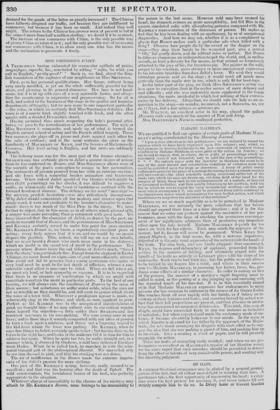MADAME 31ALIBRAN.
WE are gratified to find our opinion of certain parts of Madame MALI- BRAN'S acting comborated by the Morning Journal.
" Upon a close attention to her performance, we are induced to repeat the opinion which we have lately expressed upon this subject ; and, whilst we feel pleasure in bearing testimony to the just f.xpression of natural feeling, exhibited by Madame Malibran in some parts of the action (in Ninetto), we are bound to repeat, that, in others, she is guilty of proceedings which are calculated (even if not intended) only to split the ears of the groundhogs. We entirely agree with the 'Spectator in thinking the scene to be one of the most absurd and ostentatious violations of common sense that could be exhibited upon the stage or elsewhere. A troop of police nearly sufficient to preserve the peace of a metropolis coming to take a simple country girl into custody—the chief constable making occasional sallies out of the ranks into which his men are drawn up, catching hold of her hand for the purpose of being Hung back to the accompaniment of a roulade, or heroical or heroinical recitative, and then quietly returning to his position, until the bar in which he was to repeat the same insignificant scuffling—all this, and more which accompanied it, can only be preserved from entire contempt by the tumultuous music which accompanies the very foolish action, and which contributes to keep alive the attention of the audience."
Where we see so much capability as is to he perceived in Madame MALIBRAN, we are naturally the more solicitous that her talents should not expend their force in a false direction ; and it is for this reason that we enter our protests against the enormities of her per- formance, more with the hope of checking the pernicious encourage- ment of her injudicious admirers than of producing any immediate effect upon the lady herself. Madame MALIBRAN depends far too much on trick for her effects. Trick may catch the applause of the instant, but its favour will never be permanent. When KEAN first played Shylock, in the trial scene, he, with a nervous impatience, fidgetted (it is the only word expressive of the action) with the handle of the knife. The idea took, and was loudly clapped: thus encouraged, KEAN, by degrees and debauchery of applause, proceeded from fid- getting to the motions of fiddling, and ultimately played with the handle of his knife as actively-as LINDLEY plays with the stops of his violoncello. Such tricks had their day, but the public were not always to be tickled by the fingers like a trout, and where is their success now ?—Madame. MALIBRAN, in caressing her father, lover, &c., pro- duces some effects of a similar character. In order to convey an idea of the process, the manner of a monkey's rapid fingering must be called to mind, or the pawing of a dog jumping up and caressing with the repeated touch of his fore-feet. It is in this essentially animal style that Madame MALIBRAN expresses her endearments to many persons she has occasion to embrace in the course of La Ga.= Ladra. She touches them all over rapidly with her hands, as if taking an in- ventory of their features and limbs, and assuring herself by actual con- tact that their full proportions are present, and that absence or misfor- tune has occasioned no corporeal deficiencies. This trick, this coup de dol.* might have succeeded fairly in any one instance as indicative of agitation ; but when repeated and made the customary mode of em- brace, it became absolutely ludicrous to our minds. In the scene in which Ninetta is alarmed for her father by the approach of the Magis- trate, she sets about arranging his disguise with such effect as to sug- gest the idea that she was making a parcel of him, and packing him up in his cloak. Give a monkey a sheet of paper, and he will precisely exemplify the action. These arc faults of overacting easily avoided; and when we see per- formances so excellent as MALIBRAN'S repulse of her libertine wooer, we the more regret that such mistakes should be permitted to detract from the effect of talents of very considerable power, and wanting only the directing judgment.


















 Previous page
Previous page